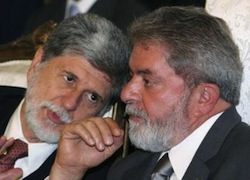Brazil Will Respect Iran Sanctions, If Passed
June 2, 2010
Featured Image
Today's top nuclear policy stories, with excerpts in bullet form.
Stories we're following today, Wednesday, June 2, 2010:
Brazil Will Oppose, But Respect, Iran Sanctions - The Associated Press [link]
- Brazil's foreign minister said Tuesday that despite the nation's strong opposition to any new sanctions on Iran, it would respect them if they are approved.
- Foreign Minister Celso Amorim spoke before a Senate committee to explain Brazil's role in an Iranian nuclear fuel-swap deal it helped broker with Turkey.
- Both Amorim and Brazilian President Luiz Inacio Lula da Silva have been outspoken in their opposition to potential new sanctions.
- Silva and Amorim, however, counter that their deal was never meant to be considered any sort of final accord on Iran's nuclear program, but merely the first step to getting the nation back to the negotiating table.
A Surprising Consensus on Nuclear Nonproliferation - Time Magazine [link]
- By having reached a consensus, the conference reinvigorated the treaty, which means the U.N. now has a stronger legal and moral case to press countries suspected of hiding nuclear programs to come clean.
- Israel's suspected weapons again caused controversy when Egypt and other nonnuclear countries pushed for a conference in 2012 to look into the feasibility of making the Middle East a nuclear-weapons-free zone.
- A nuclear-free-zone conference need not be a bad thing from the U.S. point of view, nuclear expert Deepti Choubey argues. "If you are concerned about Iran's nuclear ambitions," she says, "then a conference on a nuclear-free Middle East can be another tool or framework for trying to curb their ambitions.
- "Critics of the conference need to get past the reflexive view that this is just an attempt to criticize the Israelis," she said.
- Describing a scene of "high drama" on the final day of the conference last Friday, when delegates scrambled to reach agreement, Choubey says, "States were so eager to get an outcome in part because Obama has created a lot of political capital."
- NOTE: Deepti Choubey is a Ploughshares Fund grantee.
US Shouldn't Dismiss Turkish-Brazilian Nuclear Deal - The Huffington Post [link]
- The [Iranian fuel exchange] proposal currently being considered has the backing of Iran's Supreme Leader as well as centrists, reformists, and leaders of the Green Movement in Iran, making it more likely that Iran will abide by the terms of its commitments.
- Left unresolved in the current proposal is the troubling matter of Iran's continued enrichment of uranium up to levels approaching 20%.
- If enacted, this proposal would begin the process of addressing a major aspect of the strained relationship between Iran and the international community, and would represent a first step in halting Iran's progress toward a nuclear weapons capability.
- We urge the so-called Vienna Group to seriously pursue this proposal as an opening for further diplomatic engagement with Iran on outstanding issues of concern.
Obama's National Security Strategy: A Little George Bush, Lots of Bill Clinton - Sandy Berger in The Washington Post [link]
- For some time now, it has been clear that U.S. national security strategy needs rethinking.
- [Obama's national security strategy] reflects an understanding that we face enduring challenges -- nuclear proliferation, terrorism and regional conflicts -- for which the best response is a return to fundamentals.
- The new strategy endorses the principles that have guided administrations for decades: The use of force should be a last resort, should weigh all the costs and benefits and should have as much international support as possible.
- In the strategy's conclusions, the administration invokes an even earlier era, calling for both political parties to restore the cooperation and common purpose so crucial to our success during the dark days of the Cold War.
Nightmare Scenarios for the NPT - Michael Krepon for Arms Control Wonk [link]
- Any conference that requires consensus, with almost two hundred potential vetoes, has two most-likely outcomes: a lowest common denominator success or an ugly mess.
- The 2005 NPT Review Conference was an ugly mess. The 2010 Rev Con was a lowest common denominator success.
- Convening a conference on [a nuclear weapons-free Middle East] without the proper ground work is akin to complaining that [nuclear weapons states] are slow-balling disarmament, requiring a timetable to speed up the process.
- A NWFZ conference that places a bullseye on Israel’s back while soft-soaping Iran’s nuclear program could become a harbinger of the NPT’s demise.
- If, at the same time, the CTBT remains in limbo, and Iran continues to flaunt its disregard for the UN Security Council and the IAEA Board of Governors, the NPT’s 2015 Rev Con will likely be an ugly mess.
A View From the Dark Side
Obama Abandons Israel to UN Feeding Frenzy - Fox News [link]
- In the past twenty-four hours United Nations bodies have engaged in a frenzied attack on Israel over the Turkish-facilitated effort to end the naval blockade of Hamas-controlled Gaza. In the process, the Obama administration’s Israel policy has been outed.
- The policy shift by the Obama administration away from protecting Israel from UN hordes was also in evidence last Friday at the close of the 2010 NPT Review Conference. With the support of the President, that Conference adopted conclusions singling out Israel though Israel is not a party or subject to the treaty.
- At the meeting that was to have taken place today between President Obama and Israeli Prime Minister Benjamin Netanyahu, Netanyahu was reported to have hoped for assurances from the President that he would not advance another UN-driven onslaught against Israel.
- In view of the administration’s willingness to participate in just such events days later, a positive response – and improvement in the Obama administration’s relations with Israel – is even more unlikely.



